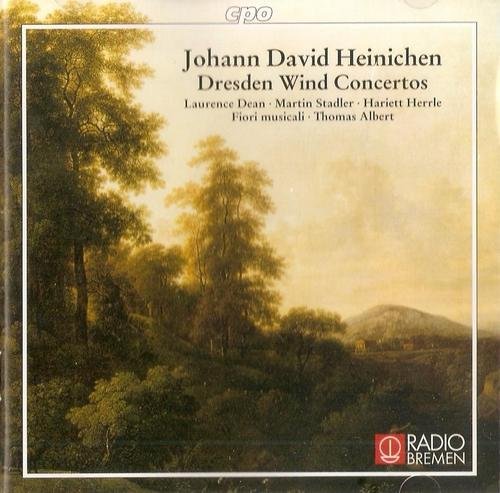
Laurence Dean, Fiori Musicali, Thomas Albert - Johann David Heinichen: Dresden Wind Concertos (1999)
BAND/ARTIST: Laurence Dean, Fiori Musicali, Thomas Albert
- Title: Johann David Heinichen: Dresden Wind Concertos
- Year Of Release: 1999
- Label: CPO
- Genre: Classical
- Quality: FLAC (tracks)
- Total Time: 57:48
- Total Size: 303 Mb
- WebSite: Album Preview
Tracklist:
Concerto for 2 oboes & orchestra in E minor, S.222
Martin Stadler, Hariett Herrle
Concerto for flute & orchestra in D major, S.225
Laurence Dean
Concerto for oboe & orchestra in G minor, S.237
Martin Stadler
Concerto for flute, violin & orchestra in E minor, S.218
Laurence Dean, Thomas Albert
Concerto for oboe & orchestra in A minor, S.212
Martin Stadler
Concerto for oboe, flute & orchestra in G minor, S.238
Martin Stadler, Laurence Dean
Fiori Musicali
Conductor, Violin: Thomas Albert
Flute: Laurence Dean
Oboe: Martin Stadler, Hariett Herrle
Concerto for 2 oboes & orchestra in E minor, S.222
Martin Stadler, Hariett Herrle
Concerto for flute & orchestra in D major, S.225
Laurence Dean
Concerto for oboe & orchestra in G minor, S.237
Martin Stadler
Concerto for flute, violin & orchestra in E minor, S.218
Laurence Dean, Thomas Albert
Concerto for oboe & orchestra in A minor, S.212
Martin Stadler
Concerto for oboe, flute & orchestra in G minor, S.238
Martin Stadler, Laurence Dean
Fiori Musicali
Conductor, Violin: Thomas Albert
Flute: Laurence Dean
Oboe: Martin Stadler, Hariett Herrle
These Heinichen concertos mix elements of both the Venetian style and the more Germanic models of his day. Heinichen traveled extensively, spending profitable years as a student and opera composer in Leipzig and later traveling and writing opera in Venice. The son of August the Strong (love that title!)thought highly of Heinichen's abilities, and encouraged the composer to take up a position in Dresden. Heinichen must have proven a considerable talent, for the Dresden Court soon after tapped him as court music director over their established and well respected in-house composer Lotti. (Who soon after left!)
These compositions find Heinichen moving easily in pure Vivaldi style - as in the Concerto for Oboe s.237, which boasts a sensational aria-like second movement backed by plucked strings, a Heinichen specialty. A remarkable piece of lyricism, explaining Heinichen's marked success in the opera houses of his day. The other concertos convey more a blend of styles, though the Italianate features do predominate. Heinichen wrote a serious text on thorough-bass, a major theoretical work of the first half of the eighteenth century. You can hear his learning on display in each of these works, but Heinichen wears his pedantry lightly, and the music never falls into the dreaded routine often afflicting too much of the music of this period.
If not the finest musical intelligence or most imaginative mind of his age, Heinichen was a highly accomplished composer, and these performances given proof to his rise to fame and high post in Dresden. Sadly, Heinichen died relatively young at 45. Limitations placed on the distribution of court music at Dresden served to weaken the composer's stature.
The concertos on this set were recorded in November 1998. Historical performance considerations are up to date as of that date. I find these concertos improve with repeated listening - a mark of Heinichen's cunning use of middle voices, the composer writing with four integral voices.
These compositions find Heinichen moving easily in pure Vivaldi style - as in the Concerto for Oboe s.237, which boasts a sensational aria-like second movement backed by plucked strings, a Heinichen specialty. A remarkable piece of lyricism, explaining Heinichen's marked success in the opera houses of his day. The other concertos convey more a blend of styles, though the Italianate features do predominate. Heinichen wrote a serious text on thorough-bass, a major theoretical work of the first half of the eighteenth century. You can hear his learning on display in each of these works, but Heinichen wears his pedantry lightly, and the music never falls into the dreaded routine often afflicting too much of the music of this period.
If not the finest musical intelligence or most imaginative mind of his age, Heinichen was a highly accomplished composer, and these performances given proof to his rise to fame and high post in Dresden. Sadly, Heinichen died relatively young at 45. Limitations placed on the distribution of court music at Dresden served to weaken the composer's stature.
The concertos on this set were recorded in November 1998. Historical performance considerations are up to date as of that date. I find these concertos improve with repeated listening - a mark of Heinichen's cunning use of middle voices, the composer writing with four integral voices.
As a ISRA.CLOUD's PREMIUM member you will have the following benefits:
- Unlimited high speed downloads
- Download directly without waiting time
- Unlimited parallel downloads
- Support for download accelerators
- No advertising
- Resume broken downloads


